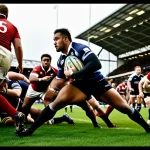Integrating Advanced Sports Technology into British Training Regimens
Sports technology, especially wearables, is revolutionising the way British athletes train. These devices deliver real-time feedback by tracking key performance metrics such as heart rate, movement patterns, and fatigue levels. Coaches use this data swiftly to adjust sessions, preventing overtraining and optimising recovery. Wearables also capture nuanced info that traditional observation might miss, enhancing individualised training decisions.
Data analytics takes this further by converting raw numbers into actionable insights. British training programmes now incorporate analytics tools to personalise workouts based on each athlete’s strengths and weaknesses. For example, analysing biomechanical data can highlight inefficiencies and track progress over time—ensuring training evolves with the athlete’s development. This approach sharpens focus, helping athletes maximise improvements and reduce injury risk.
Also to read : How is the Future of Grassroots Football in the UK Shaping Up?
Several UK sports teams exemplify this shift. Elite runners and cycling squads employ wearables and analytics to refine pacing strategies. Football clubs integrate GPS tracking alongside video analysis for targeted skill enhancement. The fusion of sports technology with expert coaching is creating a future-ready framework for British sporting excellence.
Sports Science Innovations for Enhanced Performance
Sports science now plays a crucial role in boosting British athletes’ capabilities by focusing on recovery techniques, nutrition, and injury prevention. Recovery methods like cryotherapy and compression therapy speed muscle repair, allowing athletes to train more effectively without extended downtime. Nutrition science tailors dietary plans to individual metabolic needs, ensuring optimal energy levels and faster recovery.
Topic to read : Why Is Rugby Union Growing in Popularity Across the UK?
Injury prevention strategies combine biomechanical assessments with targeted physiotherapy. By analysing movement patterns and identifying weaknesses, sports science helps create personalised rehabilitation protocols that reduce re-injury risks. This holistic approach integrates seamlessly with ongoing training, enhancing long-term athlete health.
British athletes increasingly adopt these innovations to maintain peak condition. For example, elite runners often combine tailored nutrition with advanced recovery protocols to sustain endurance. Footballers leverage physiotherapy alongside injury prevention techniques to minimize time lost to common strains. These sports science advancements underscore the vital link between health maintenance and athletic performance, making scientific methods indispensable in modern British training regimens.
Adopting Global Best Practices for British Athletic Success
Adapting global training methods allows British sports programmes to gain a competitive edge. Leading nations often integrate diverse techniques tailored to their athletic cultures; British sports can benefit by selectively adopting these proven approaches. For example, utilising periodisation strategies from Eastern Europe has improved endurance training among British distance runners. This method breaks training into phases to optimise performance peaks and recovery.
Another key practice involves adapting foreign coaching styles, such as the emphasis on technical precision found in East Asian sport disciplines. British coaches increasingly blend these styles with homegrown strategies, creating hybrid training systems that suit local athletes. Such international learning encourages flexibility and innovation, essential for success on the world stage.
Successful global competitors also invest heavily in holistic athlete development, combining mental conditioning with physical training. British sports now incorporate psychological resilience techniques inspired by global practices to enhance focus and stress management. Embracing this multidisciplinary approach helps athletes perform consistently under pressure.
In summary, learning from worldwide champions offers British sports a roadmap to elevate standards. By integrating global training methods thoughtfully, British athletes enhance their performance, fostering sustained international success.
Expert Insights and Recommendations for Modernising Training
Leading British coaches stress the importance of combining expert advice with evolving technology to enhance athlete development. They emphasise a tailored approach, where coaching tips focus on individualisation, recognising that no two athletes respond identically to training stimuli. Precision in monitoring progress and adapting plans is paramount.
Experts recommend integrating multidisciplinary feedback, encompassing physical, mental, and technical factors. For instance, combining biomechanical assessments with psychological coaching helps build resilience and technical skills simultaneously. This holistic perspective supports sustainable performance gains.
Continuous education is another key insight. British coaches advocate for accessing resources that offer the latest research findings and practical training innovations. Engaging with professional networks and workshops encourages knowledge exchange, keeping athlete development strategies current and effective.
Athletes are encouraged to take ownership of their progress by actively communicating with coaches and utilising feedback from wearable devices and data analytics. This collaborative dynamic fosters motivation and self-awareness, critical for long-term success. Ultimately, informed coaching strategies grounded in expert advice create adaptable, forward-thinking British sports programmes.










